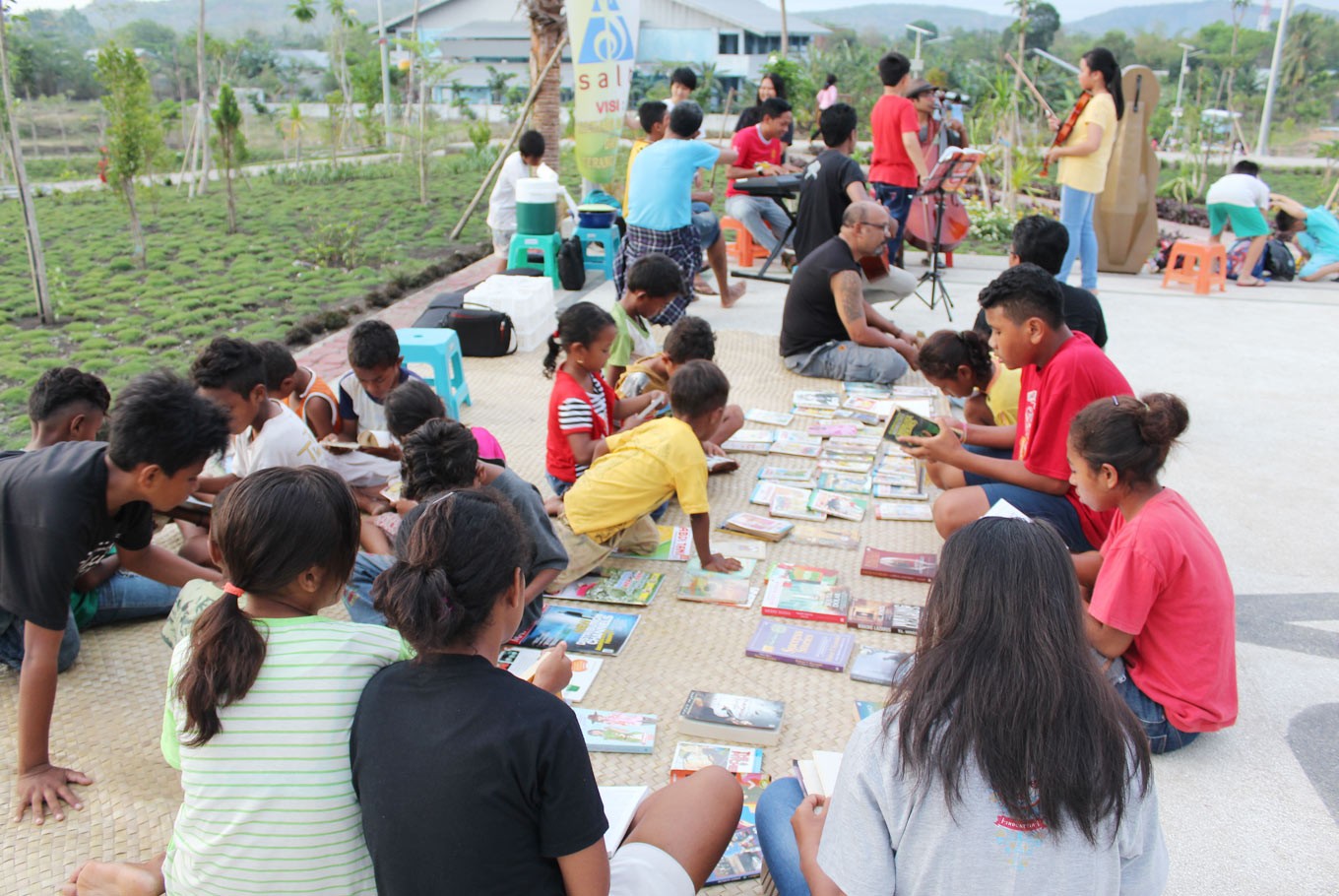Popular Reads
Top Results
Can't find what you're looking for?
View all search resultsPopular Reads
Top Results
Can't find what you're looking for?
View all search resultsGarden library brings books to public spaces in Kupang, Atambua
Change text size
Gift Premium Articles
to Anyone
Literacy has been a global concern around the world and Indonesia is no exception.
On the archipelago, Nusa Tenggara Timur is among the poorest provinces with low literacy rates.
Currently, many schools have implemented literacy programs, including a daily 15 minutes reading time before class. However, does the program run every day? Teachers have already felt the pressure and burden of administration and curriculum tasks. Some teachers admitted they rarely saw students reading books during free time, and to some extent, they have lost creative ways of attracting students to read.
A literacy activist group, LEKO, in Kupang-NTT provides free books in Taman Nostalgia Kupang every Saturday afternoon in the park. They bring their own books and display them on a floor mat. People enjoying the park are welcome to read the books. LEKO states that most of the readers are children and young adults.
Recently, LEKO activists collaborated with Alternative Reading Space (SALT) Atambua. Together, they provided free books from SALT's library in the Fronteira Garden, Atambua.
Children who came to the garden to run around became interested in looking at the books and began reading. Some parents also sat on the ground to read. They enjoyed reading and listened to live music played by SALT’s music group. One of the parents said this is creative and it never crossed their mind that a garden can be a good place for reading.
While other countries are accustomed to reading in public spaces, Indonesia's focus remains on reading inside classrooms and at libraries.
In Europe, Australia and the United States we find common views on how people enjoy reading in public spaces, and that a library is available close to home.
Nothing is wrong with reading inside a room. But do we still expect more when many library designs are not student friendly?
In many schools, the library is no more than a messy storeroom with poor airflow. The library is not a comfortable place for readers. In addition to poor library design, people find it difficult to get access to libraries.
Bringing books into public spaces is a creative way of inculcating a love for reading. Kids and adults, who live far from the public library or those who are not sure where their library is, can easily get access to books through public spaces.
In NTT, I have observed that reading outside a room is seen as showing off whereby readers want to show how smart they are. On the other hand, because of this, some are shy or reluctant to bring books and read it in public spaces.
What LEKO and SALT have achieved is an example of how to make books available to people, and make public spaces such as gardens a comfortable place for many positive activities including reading.
President Joko “Jokowi” Widodo has decided to ship books for free on the 17th of every month. The aim of the program is to ease the shipping of books to remote areas, to support educational equity and to improve reading habits.
Most libraries in Indonesia are rarely visited for several reasons; not many people are interested in reading, limited book resources, the distance between their home and a state library and an uncomfortable atmosphere in the library building.
The book access issue in Indonesia is not merely about adding to the number of books in a library, which is rarely visited, but how those books are brought to people to read. This requires creative ways.
Growing demand of digital literacy program must face a stark reality as about 90,000 primary and secondary schools in Indonesia have no internet network, and about 17,000 schools have no access to electricity. But building a reading habit should not wait until electricity and the internet are equally distributed to all areas in Indonesia.
We need more creativity in bringing books to people. I saw many kids enjoying their time reading in the garden and they expect it to become routine every week. Instead of imagining a beautiful and complete library, which seems just an illusion in remote areas, providing books in public spaces provides a chance for people to enjoy reading in an environment where they feel comfortable. The issue is that people in remote areas have limited references. Their reference is that the garden is a place for playing and not for reading.
Literacy activists need support from many parties so that their activities can be replicated in the remote areas of Indonesia. The idealism of literacy activism will eventually decline if the government does not provide support to activists.
Indonesia needs more creativity beyond indoor reading rooms in improving literacy rate including providing books or bringing books to public spaces.
Hopefully, by creating a place for reading such as in Taman Nostalgia Kupang and Fronteira Garden Atambua, we can start inspiring and motivating people and our younger generation to read more and take action to make our communities a better place. (dev/kes)
***
Greg Abanit Asa is one of the founders of Sanggar Belajar Alternatif (SALT) Atambua-NTT and former news writer in Metro TV. He graduated from Flinders University, South Australia, with a master’s degree in International Development.
---------------
Interested in writing for thejakartapost.com? We are looking for articles and opinions from experts in a variety of fields, as well as others with strong writing skills. Submit your original piece to community@jakpost.com on the following topics: lifestyle (beauty, fashion, food), entertainment, science & technology, health, parenting, social media and sports. Click here for more information.











